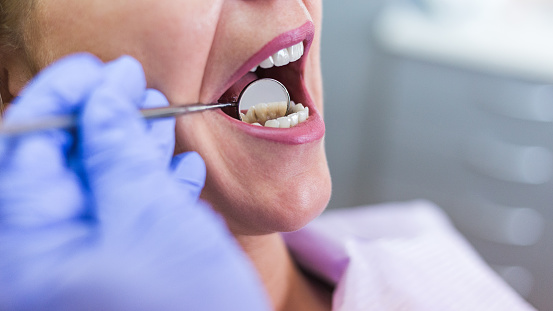Oral Cancer Lumps/Signs
 Oral cancer, or cancer of the oral cavity, is a general term for several types of cancer that begin in the mouth and its surrounding structures. These cancers can begin anywhere in the mouth, although they most often manifest on the tongue, lips, and floor of the mouth. Oral cancer, or cancer of the oral cavity, is a general term for several types of cancer that begin in the mouth and its surrounding structures. These cancers can begin anywhere in the mouth, although they most often manifest on the tongue, lips, and floor of the mouth.
Lumps/Signs of Oral Cancer
The following are some of the most typical warning signs of oral cancer:
| • |
Hurting throat
|
| • |
Hard-to-treat oral ulcers
|
| • |
Problems with chewing and swallowing
|
| • |
Trouble speaking because of the jaw or tongue stiffness
|
| • |
A sore or blemish on the gums, tonsils, and tongue
|
| • |
Continuous discomfort in the oral cavity
|
| • |
Cheek enlargement or lump
|
| • |
An ache in the jaw or teeth
|
| • |
A burning or heavy sensation in the throat
|
| • |
Facial or oral numbness
|
| • |
Jaw swelling that causes discomfort or a poor fit for dentures
|
| • |
Constant bouts of foul breath
|
| • |
Voice modification
|
| • |
Neck bump
|
| • |
Weight loss |
Approach our surgeons at Surf City Oral and Maxillofacial Surgery to get suggestions for your next course of action. We will conduct tests for oral cancer if any of the aforementioned symptoms occur. Oral cancer, like other forms of the disease, is best treated if caught early.
Origin of Oral Cancer
Squamous cells in the mouth are the first to become malignant, leading to oral cancer. Microscopically, squamous cells are flat. Normal squamous cells transform into cancer when their DNA changes and they start dividing uncontrollably.
Factors Contributing to Oral Cancer
Oral cancer begins in one area of the mouth and can spread to other parts, such as the throat, tongue, jaw, and neck.
The following behaviors are associated with mouth cancer:
| • |
Using tobacco products can lead to oral cancer. Nicotine can still be obtained through the use of smokeless tobacco products such as dip, snuff, chewing tobacco, and water pipes.
|
| • |
Consuming alcohol regularly can lead to oral cancer.
|
| • |
Using little or no lip protection when out in the sun can also increase the chances of developing oral cancer.
|
| • |
If you have someone in your family suffering from oral cancer, you might also get it. |
How Do Doctors Go About Curing Patients of Oral Cancer?
A dental specialist will remove the abnormal growth, such as lumps, from the mouth; thereafter, they will use radiation therapy or chemotherapy to kill any remaining cancer cells.
How Can You Prevent Oral Cancer?
Your chance of developing mouth cancer can be lowered by:
| • |
Don't start smoking and if you do, give it up. Don't start using tobacco if you don't already. Chewing or smoking tobacco exposes oral tissue to substances that can cause cancer.
|
| • |
If you choose to drink alcohol, do so in moderation. If you drink excessively regularly, you may increase your risk of developing mouth cancer due to the irritation caused to your oral tissues.
|
| • |
Protect your lips from the sun as much as possible. Avoid direct sunlight on your lips at all costs. Protect your mouth and face from the sun by wearing a hat with a wide brim. Use a lip balm with sun protection.
|
| • |
Maintain routine dental checkups. Request that your dentist check your entire mouth during your regular checkups for any signs of abnormal tissue that could point to oral cancer or precancerous alterations. |
Our dental specialists at Surf City Oral and Maxillofacial Surgery assist those who have oral cancer.
Call Surf City Oral and Maxillofacial Surgery at 657-384-2787 to schedule an appointment. |
 Oral cancer, or cancer of the oral cavity, is a general term for several types of cancer that begin in the mouth and its surrounding structures. These cancers can begin anywhere in the mouth, although they most often manifest on the tongue, lips, and floor of the mouth.
Oral cancer, or cancer of the oral cavity, is a general term for several types of cancer that begin in the mouth and its surrounding structures. These cancers can begin anywhere in the mouth, although they most often manifest on the tongue, lips, and floor of the mouth.